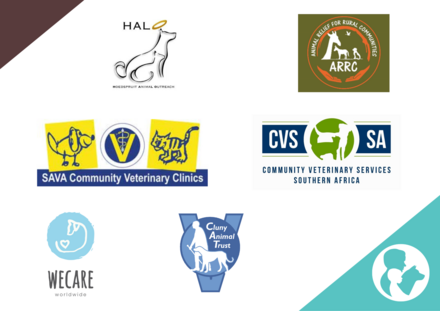Communities Against Rabies: Explained
Just 6 months ago, GARC and partners launched the Communities Against Rabies initiative. The initiative was an organic shift in focus of the End Rabies Now campaign to support community-level initiatives and recognize the work being done on the ground by local champions. Why was this shift in focus so important and so timely? If we take a step back and look at the global progress of rabies elimination, the End Rabies Now campaign platform was initially created to set a global goal for dog-mediated human rabies elimination. As we all know, this happened when the Zero by 30 target was set. Following this milestone, the ERN campaign helped to bring together the tripartite and GARC to deliver the Global Strategic Plan in 2018. Having achieved these monumental successes, it was time to shift the focus of the ERN campaign.
As a result, GARC and partners launched the Communities Against Rabies (CAR) initiative. But what is CAR? The idea is simple:
- Progress is being made at the international level through the Global Strategic Plan and United Against Rabies Forum.
- National governments are driving rabies elimination efforts through the development of National Plans (using the SARE) and implementing these plans.
- But a gap exists at the local level – in the communities affected by rabies – where support and coordination are needed.
The CAR initiative aims to address this gap at the local level. It aims to support communities to improve efforts and outcomes towards rabies elimination.

What will CAR do?
This may sound like a great idea and is certainly something that is needed, but what will the CAR initiative actually do? We could use a lot of buzz phrases like “building capacity in at-risk communities” or “engaging local level partners to drive elimination” or “support rabies elimination efforts from the ground up” but without context, these phrases seem like empty promises told by politicians. In plain language, the CAR is about action and support for the people doing the hard work in rabies elimination – it is for those who are in the communities vaccinating dogs, educating people and really making a difference, one person and one animal at a time.
Who can be involved?
The CAR initiative is for those individuals, groups, NGOs and partners who are doing the work on the ground. That means that anyone involved in rabies elimination efforts can be part of this initiative.
- Individuals: Whether you are a dedicated professional or even just a caring community member, you can be part of the CAR initiative.
- NGOs and other local partners: Any NGO, private veterinarian, student association or local government can be part of the CAR initiative. The only criterion is that you are working towards rabies elimination through education and dog vaccination. No matter the size – if you are a team of two or a team of two hundred, it doesn’t matter. You are making a difference and the CAR initiative was created to support you!
How does the CAR work?
The CAR initiative is split into three levels to ensure that every person and stakeholder interested in or working on rabies can participate and contribute.
Individual level:
Individuals interested in supporting the improved welfare and wellbeing of dogs, and rabies elimination efforts, can become Dog Health Champions. These people can simply be interested people in a community, advocates for dog welfare and rabies elimination, or professionals working with dogs. Importantly, while a Dog Health Champion (DHC) has a keen interest in rabies elimination, the skills shared are aimed towards the general improvement of dog wellbeing and the relationship between humans and animals – going beyond just rabies and further into other dog diseases and welfare issues.
The DHC program will be a continuous education program, where additional courses and materials will be added. As these new education resources are released, additional tiers of DHCs will be introduced. Currently, only the Bronze DHC tier is accessible, with the requirements for people to have completed the Rabies Educator Certificate (REC) and the Community Coordinator for Rabies Certificate (CCC) courses. However, this year, GARC will release a new course that will open the next tier, allowing Bronze DHCs to progress to Silver.
This format will ensure that people continue to build their knowledge and awareness about dog health and welfare and the impact it has on communities, as well as their own profiles as knowledgeable and trustworthy sources of information.
Organization level:

Organizations can become recognized as official Rabies Centers of Excellence (RCEs). This means that the work that they are doing against rabies - which must include dog vaccination – is recognized as a driving force for their community to achieving rabies elimination. These RCEs are leaders in their country or geographical area that can be emulated. The key is that these RCEs use a standardized, scientifically-proven approach to elimination through tools such as the (free) GARC surveillance tools – ensuring that the data captured is standardized and useful to all – and by having personnel recognized as DHCs. This means that the people working in these organizations are educated with the same knowledge – aligning principles and ensuring a strong foundation. Furthermore, GARC will work with national governments to encourage these RCEs to be recognized by the government ministries for their contributions to the national strategic plans in the respective country.
Community level:
The last level in the process brings everything together. The Partners for Community Dog Health (PCDH) will be a collective of all the RCEs within an area, coupled with the local government. The different RCEs will share data, resources and strategies with other organizations working in a similar area so that efforts are not duplicated, and more effective and efficient approaches are used to eliminate rabies and improve dog health in an area. Critically, the involvement of the local government is essential for sustainability and ensuring that approaches are aligned with the national strategy.
How can I get support?
Individuals can become Dog Health Champions by undertaking GARC’s self-paced, free online education courses, starting with the REC and CCC courses.
Organizations will need to meet certain criteria, including having personnel recognized as DHCs as well as using the GARC surveillance tools to track their interventions. Currently, RCEs are only being recognized in three countries, but do not despair – GARC will still offer you support.
Where is the initiative currently active?
The CAR initiative was initially launched in Sri Lanka, Nepal and South Africa.
If you are not in one of the target countries, do not despair! We are always looking for the next country to expand the initiative to. You can make a strong case for your country to be next by meeting the criteria to be recognized as an RCE and letting us know. If several organizations meet the criteria in a country, we will most likely open the initiative to your country next!
Does the CAR initiative really work?
The short answer is YES! In the first six months, more than 700 people have been recognized as Bronze Dog Health Champions. If you follow GARC on social media, you would have already seen messages from these Bronze DHCs highlighting their achievements.
In addition, GARC has already officially recognized 6 Rabies Centers of Excellence and is providing these groups with tools, resources, and other support to help standardize approaches, raise the standards of interventions, and improve collaboration and coordination.
What can I expect next from CAR?
The next tier of Dog Health Champions will launch this year. Soon, Bronze Dog Health Champions will be able to continue their education and build their profile of skills with more of GARC’s education courses (including some new ones to come) so that they can be recognized as Silver Dog Health Champions!
The GARC team will also continue to engage with partners in the target countries to build a bigger network of Rabies Centers of Excellence. Remember that if you are not in a current target country, there is hope! We will continue to expand and grow the program to include new countries. However, choosing which country will be next will be in large parts reliant upon the demand. If there are many groups from a country that have met the criteria to be recognized as RCEs, we will most likely expand to that country next.
We encourage you to get involved. Whether you are an individual who cares about dogs and rabies elimination, a professional working in communities, a local NGO, a student association, a private practice or the local government, get involved in the CAR initiative today! Make the case for your country to be supported next! Learn what you need to do and more about CAR.
Article contributed by: Terence Scott (GARC).